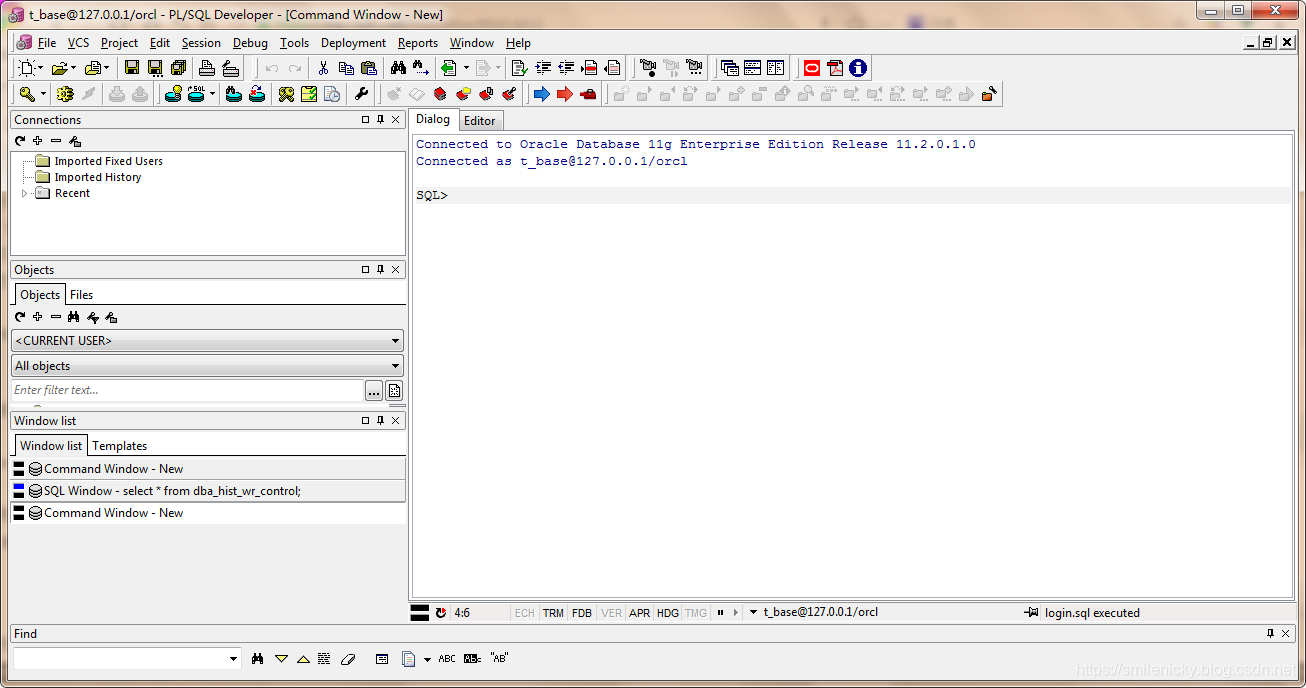Oracle AWR报告生成和性能分析
一、AWE报告生成步骤
对于SQL调优,局部SQL,我们可以直接使用执行计划等直接调优,而对于整个系统来说?这时候就可以用Oracle系统自带的报告对系统进行整体分析了,Oracle提供好几种性能分析的报告,比如AWR、ASH、ADDM等等
这篇博客主要介绍AWR
AWR全称Automatic Workload Repository,自动负载信息库,是Oracle 10g版本后推出的一种性能收集和分析工具,提供了一个时间段内整个系统的报表数据。通过AWR报告,可以分析指定的时间段内数据库系统的性能。
1.1 工具选择
对于Oracle数据库可以使用sqlplus或者plsql developer客户端软件
sqlplus 使用
可以使用sqlplus工具登录
进入数据库
sqlplus / as sysdba
查看用户
show parameter db_name
用登录之后才可以使用
plsql developer使用
plsql developer也可以使用,登录之后,选择文件(File)->新建(New)->命令窗口(Command Window)

1.2 自动创建快照
开始压测后执行
exec DBMS_WORKLOAD_REPOSITORY.CREATE_SNAPSHOT ();
可以通过dba_hist_wr_control查看当前的配置情况,当前awr为每1小时做一次数据快照,保留时间为8天。
select * from dba_hist_wr_control;

修改配置,每隔30分钟收集一次,保存1天
execute dbms_workload_repository.modify_snapshot_settings(interval=>30,retention=>14000);
关闭AWR自动收集
SQL>exec dbms_workload_repository.modify_snapshot_settings (interval=>0,retention=>24*60);
注:10g默认是自动开启awr信息收集的,会对系统有一定的影响(很小);如果要关闭awr信息收集,只需设置interval参数为0即可。但interval设0后,AWR报告无法生成。
1.3 手工创建快照
除了自动创建快照,也可以手工创建快照
select dbms_workload_repository.create_snapshot() from dual;
1.4 生成AWR报告
在sqlplus或者plsql使用命令,${ORACLE_HOME}是Oracle的安装路径
@/${ORACLE_HOME}/.../RDBMS/ADMIN/awrrpt.sql
例如我的命令为:
@D:/oracle/product/11.1.0/db_1/RDBMS/ADMIN/awrrpt.sql
sqlplus登录的可以使用
@?/rdbms/admin/awrrpt/awrrpt.sql
@?/rdbms/admin/awrrpt; 本实例AWR包括:
@?/rdbms/admin/awrrpti; RAC中选择实例号
@?/rdbms/admin/awrddrpt; AWR 比对报告
@?/RDBMS/admin/awrgrpt; RAC全局AWR报告
执行命令之后,会提示你输入一些参数
- (1) Enter value of report_type
意思是生成报告的格式有两种,html和txt,这里选择html - (2) Enter value of num_days
收集几天的报告信息,数字,可以输入1 - (3) Enter value of begin_snap
输入开始快照id,要根据日志打印的快照id范围来填
例如我实验时候,日志打印的快照id范围为:6727 ~6745
Listing the last day's Completed Snapshots
INST_NAME DB_NAME SNAP_ID SNAPDAT LV
------------ ------------ -------- ------------------ --
orcl ORCL 6727 17 4月 2019 00:00 1
orcl ORCL 6728 17 4月 2019 01:00 1
orcl ORCL 6729 17 4月 2019 02:00 1
orcl ORCL 6730 17 4月 2019 03:00 1
orcl ORCL 6731 17 4月 2019 04:00 1
orcl ORCL 6732 17 4月 2019 05:00 1
orcl ORCL 6733 17 4月 2019 06:00 1
orcl ORCL 6734 17 4月 2019 07:00 1
orcl ORCL 6735 17 4月 2019 08:00 1
orcl ORCL 6736 17 4月 2019 09:00 1
orcl ORCL 6737 17 4月 2019 10:00 1
orcl ORCL 6738 17 4月 2019 11:00 1
orcl ORCL 6739 17 4月 2019 12:00 1
orcl ORCL 6740 17 4月 2019 13:00 1
orcl ORCL 6741 17 4月 2019 14:00 1
orcl ORCL 6742 17 4月 2019 14:13 1
orcl ORCL 6743 17 4月 2019 14:15 1
orcl OANET 6744 17 4月 2019 14:16 1
orcl OANET 6745 17 4月 2019 14:40 1
所以我随意填写:6743
- (4) Enter value of end_snap
输入结束快照id,要根据日志打印的快照id范围来填,所以我随意填写:6745
SQL> @D:/oracle/product/11.1.0/db_1/RDBMS/ADMIN/awrrpt.sql
Current Instance
~~~~~~~~~~~~~~~~
DBID DB_NAME INST_ INST_NAME
---------- ------------ ----- ------------
4279242421 ORCL 1 orcl
rpt_options
---------
0
Specify the Report Type
~~~~~~~~~~~~~~~~~~~~~~~
Would you like an HTML report, or a plain text report?
Enter 'html' for an HTML report, or 'text' for plain text
Defaults to 'html'
Type Specified: html
Cannot SET TRIMSPOOL
Cannot SET UNDERLINE
Instances in this Workload Repository schema
~~~~~~~~~~~~~~~~~~~~~~~~~~~~~~~~~~~~~~~~~~~~
DBBID INSTT DBB_NAME INSTT_NAME HOST
------------ ----- ------------ ------------ ------------
* 4279242421 1 ORCL ORCL zwdb
Using 4279242421 for database Id
Using 1 for instance number
dbid
---------
4279242421
inst_num
---------
1
inst_num
---------
1
dbid
---------
4279242421
max_snap_time
---------
17/04/2019
Specify the number of days of snapshots to choose from
~~~~~~~~~~~~~~~~~~~~~~~~~~~~~~~~~~~~~~~~~~~~~~~~~~~~~~
Entering the number of days (n) will result in the most recent
(n) days of snapshots being listed. Pressing <return> without
specifying a number lists all completed snapshots.
Listing the last day's Completed Snapshots
INST_NAME DB_NAME SNAP_ID SNAPDAT LV
------------ ------------ -------- ------------------ --
orcl ORCL 6727 17 4月 2019 00:00 1
orcl ORCL 6728 17 4月 2019 01:00 1
orcl ORCL 6729 17 4月 2019 02:00 1
orcl ORCL 6730 17 4月 2019 03:00 1
orcl ORCL 6731 17 4月 2019 04:00 1
orcl ORCL 6732 17 4月 2019 05:00 1
orcl ORCL 6733 17 4月 2019 06:00 1
orcl ORCL 6734 17 4月 2019 07:00 1
orcl ORCL 6735 17 4月 2019 08:00 1
orcl ORCL 6736 17 4月 2019 09:00 1
orcl ORCL 6737 17 4月 2019 10:00 1
orcl ORCL 6738 17 4月 2019 11:00 1
orcl ORCL 6739 17 4月 2019 12:00 1
orcl ORCL 6740 17 4月 2019 13:00 1
orcl ORCL 6741 17 4月 2019 14:00 1
orcl ORCL 6742 17 4月 2019 14:13 1
orcl ORCL 6743 17 4月 2019 14:15 1
orcl OANET 6744 17 4月 2019 14:16 1
orcl OANET 6745 17 4月 2019 14:40 1
dbid
---------
4279242421
inst_num
---------
1
max_snap_time
---------
17/04/2019
Specify the Begin and End Snapshot Ids
~~~~~~~~~~~~~~~~~~~~~~~~~~~~~~~~~~~~~~
Begin Snapshot Id specified: 6743
End Snapshot Id specified: 6745
bid
---------
6743
eid
---------
6745
inst_num
---------
1
dbid
---------
4279242421
bid
---------
6743
eid
---------
6745
Cannot SET TRIMSPOOL
Cannot SET UNDERLINE
Specify the Report Name
~~~~~~~~~~~~~~~~~~~~~~~
The default report file name is awrrpt_1_6743_6745.html. To use this name,
press <return> to continue, otherwise enter an alternative.
Using the report name awr.html
Started spooling to D:\Program Files\PLSQL Developer 8.0.3.1510\awr.html
二、AWR报告分析
2.1 AWR之DB Time
DB Time主要用来判断当前系统有没有相关瓶颈,是否较为频繁访问系统导致等待时间很长?然后要怎么看?一般来说,Elapsed时间乘以CPU个数如果大于DB Time,就是正常的,系统压力不大,反之就说明压力较大,例子如图,24.93*8很明显大于0.49,所以说明系统压力很小

2.2 AWR之load_profile
load_profile指标主要用来显示当前系统的一些指示性能的总体参数,这里介绍一些Redo_size,用来显示平均每秒的日志尺寸和平均每个事务的日志尺寸,有时候可以结合Transactions这个每秒事务数,分析当前事务的繁忙程度
如图,平均每秒的事务数Transactions非常小,说明系统压力非常小,一般来说Transactions不超过200都是正常的,或者200左右都是正常的,超过1000就是非常繁忙了,再看看平均每秒的日志尺寸是4位数的,平均每个事务的日志尺寸是5位数的,说明了系统访问不是很频繁,而单个业务是比较复杂的,如果反过来,平均每秒日志尺寸比平均每秒事务日志尺寸大很多,说明系统访问很频繁,而业务比较简单,不需要响应很久

2.3 AWR之efficiency percentages
efficiency percentages是一些命中率指标。Buffer Hint、Library Hint等表示SGA(System global area)的命中率;Soft Parse指标表示共享池的软解析率,如果小于90%,就说明存在未绑定变量的情况

2.4 AWR之top 10 events
Top 10 Foreground Events by Total Wait Time,等待事件是衡量数据库优化情况的重要指标,通过观察Event和%DB time两列就可以直观看出当前数据库的主要等待事件
如图可以看出系统面试的主要是CPU被占用太多了和锁等待
 ### 2.5 AWR之SQL Statistics
### 2.5 AWR之SQL Statistics
SQL Statistics从几个维度列举了系统执行比较慢的SQL,可以点击,然后拿SQL去调优,调优SQL可以用执行计划看看

对于AWR的性能指标还有很多,本博客是看了《收获,不止SQL优化》一书的笔记,这里只简单介绍一些比较重要的指标


 浙公网安备 33010602011771号
浙公网安备 33010602011771号